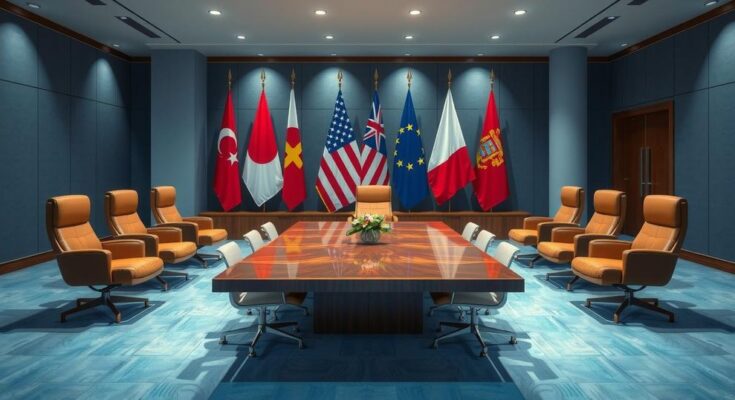Felix Tshisekedi and Paul Kagame met in Qatar to discuss the security crisis in eastern DRC, marked by allegations of Rwandan support for the M23 rebellion. Mediated by the emir of Qatar, the meeting led to a mutual commitment to an immediate ceasefire, despite ongoing tensions and external sanctions affecting both nations. The dialogue illustrates a potential shift in negotiation dynamics regarding the conflict in the region.
On Tuesday, Felix Tshisekedi and Paul Kagame convened in Qatar for direct negotiations regarding the prolonged security crisis in eastern Democratic Republic of the Congo (DRC). This meeting, mediated by the emir of Qatar, aimed to address allegations from Kinshasa that Kigali has been supporting the M23 rebellion, which has overtaken substantial territories in South and North Kivu. Despite the validity of these claims being echoed by several United Nations reports, Kigali firmly denies such accusations.
Efforts to reignite dialogue between the two nations have been ongoing, and this latest interaction marked a significant development. The meeting commenced at 4 PM local time in Doha and continued for approximately 45 minutes. Reports indicate the atmosphere was “cordial,” reflecting the emir’s mediation efforts previously attempted in January 2023, which had been abruptly canceled.
Political analyst Tresor Kibangula noted that external pressures such as Western sanctions are beginning to impact President Kagame, while President Tshisekedi has shifted towards openness in negotiating with the M23, a stance he previously opposed. This change comes as the geopolitical landscape alters, particularly following the M23’s recent successes in Goma and Bukavu.
A crucial outcome of the dialogue was a mutual commitment to an immediate ceasefire. This agreement follows the failure of anticipated peace discussions in Angola earlier that day. A close advisor to the Congolese presidency revealed that details of the meeting were intentionally kept hidden until Tshisekedi’s return, emphasizing that all parties reaffirmed their commitment to an unconditional ceasefire.
The leaders also recognized the urgent necessity for “direct political dialogue” concerning the fundamental issues fueling the conflict in eastern DRC. A statement from Kagame underscored the potential for expedited progress contingent upon collaborative efforts from all involved parties, with spokesperson Tina Salama announcing an agreed ceasefire and plans for implementation to be discussed shortly.
Earlier developments indicated that peace talks in Angola were canceled after the M23 group opted out the last moment, expressing concerns over international sanctions hindering dialogue. They criticized a campaign from Kinshasa, citing that these hostilities were causing obstacles to peace negotiations.
The M23, which claims to advocate for the rights of Congolese Tutsis, made notable territorial gains since January, reportedly resulting in thousands of fatalities. The latest UN reports have suggested that Rwanda controls the M23 and exerts military support to exploit valuable minerals like gold and coltan in the DRC, although Rwanda consistently denies these military allegations, instead claiming self-defense against threats from the DRC’s FDLR group.
The meeting between President Tshisekedi of the DRC and President Kagame of Rwanda in Qatar represented a critical step towards addressing the ongoing security issues in eastern DRC exacerbated by the M23 rebellion. The expressed commitment to a ceasefire and the initiation of dialogue indicate a foundational effort to stabilize the region. However, external pressures and suspicions continue to complicate the pathway towards lasting peace.
Original Source: www.rfi.fr




